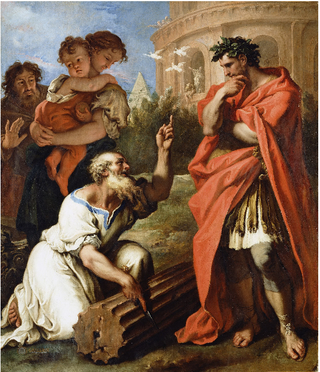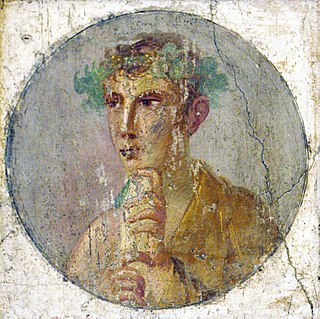The name

The name Vindicius may have been invented for the story, [6] but appears as a nomen in Roman Imperial literature and inscriptions especially in Roman Africa [ citation needed ] and Gaul into late antiquity. [lower-alpha 1]
Vindicius ( fl. 509 BC) was a Roman slave manumitted for his service to the Roman Republic in the first year after it was founded. Ancient sources tell the story as an aetiology for manumissio vindicta, a form of manumission that granted the former slave Roman citizenship. The historicity of Vindicius and the linguistic validity of connecting his name to the etymology of vindicta are dubious, but the story is an example of how Roman legendary history valued patriotism and integrated slaves into civic life. [1]
Vindicius was said to have discovered papers that exposed Tarquin's plot to regain power after the overthrow of the Roman monarchy. Tarquin had been attempting to have his possessions legally restored to him, and the papers indicated that he was doing so in order to be allowed into Rome again with the intention of killing Rome's first consuls, Collatinus and Brutus, and reinstalling himself as king. Vindicius gave these papers to Publius Valerius Publicola on account of the "affable and kindly ways of the man," according to his biographer Plutarch. [2] The meritorious behavior of Vindicius despite his servile status is contrasted to that of the privileged nephews of Collatinus and the sons of Brutus, who conspired in the restoration plot, and Brutus puts his own sons to death. [3]
As a reward for his service, Vindicius was released from slavery, granted citizenship, and given the property which was about to restored to Tarquin. [4] According to tradition, this act established that a slave freed by a citizen master through the same legal procedure would acquire citizenship. The story has explanatory rather than historical value in indicating that the Romans thought that manumissio vindicta predated the Twelve Tables, Rome's early body of laws, by at least fifty years. [5]

The name Vindicius may have been invented for the story, [6] but appears as a nomen in Roman Imperial literature and inscriptions especially in Roman Africa [ citation needed ] and Gaul into late antiquity. [lower-alpha 1]

Lucius Tarquinius Superbus was the legendary seventh and final king of Rome, reigning 25 years until the popular uprising that led to the establishment of the Roman Republic. He is commonly known as Tarquin the Proud, from his cognomen Superbus.

According to Roman tradition, Lucretia, anglicized as Lucrece, was a noblewoman in ancient Rome. Sextus Tarquinius (Tarquin) raped her and her subsequent suicide precipitated a rebellion that overthrew the Roman monarchy and led to the transition of Roman government from a kingdom to a republic. After Tarquin raped Lucretia, flames of dissatisfaction were kindled over the tyrannical methods of Tarquin's father, Lucius Tarquinius Superbus, the last king of Rome. As a result, the prominent families instituted a republic, drove the extensive royal family of Tarquin from Rome, and successfully defended the republic against attempted Etruscan and Latin intervention.

Servius Tullius was the legendary sixth king of Rome, and the second of its Etruscan dynasty. He reigned from 578 to 535 BC. Roman and Greek sources describe his servile origins and later marriage to a daughter of Lucius Tarquinius Priscus, Rome's first Etruscan king, who was assassinated in 579 BC. The constitutional basis for his accession is unclear; he is variously described as the first Roman king to accede without election by the Senate, having gained the throne by popular and royal support; and as the first to be elected by the Senate alone, with support of the reigning queen but without recourse to a popular vote.

Year 72 BC was a year of the pre-Julian Roman calendar. At the time it was known as the Year of the Consulship of Publicola and Lentulus. The denomination 72 BC for this year has been used since the early medieval period, when the Anno Domini calendar era became the prevalent method in Europe for naming years

Libertas is the Roman goddess and personification of liberty. She became a politicised figure in the late republic. She sometimes also appeared on coins from the imperial period, such as Galba's "Freedom of the People" coins during his short reign after the death of Nero. She is usually portrayed with two accoutrements: the spear and a phrygian cap, which she holds out on the spear, rather than wears on her head.

Lucius Junius Brutus was the semi-legendary founder of the Roman Republic, and traditionally one of its first consuls in 509 BC. He was reputedly responsible for the expulsion of his uncle the Roman king Tarquinius Superbus after the suicide of Lucretia, which led to the overthrow of the Roman monarchy. He was involved in the abdication of fellow consul Tarquinius Collatinus, and executed two of his sons for plotting the restoration of the Tarquins.

The Rape of Lucrece (1594) is a narrative poem by William Shakespeare about the legendary Roman noblewoman Lucretia. In his previous narrative poem, Venus and Adonis (1593), Shakespeare had included a dedicatory letter to his patron, the Earl of Southampton, in which he promised to compose a "graver labour". Accordingly, The Rape of Lucrece has a serious tone throughout.

The gens Junia or Iunia was one of the most celebrated families of ancient Rome. The gens may originally have been patrician, and was already prominent in the last days of the Roman monarchy. Lucius Junius Brutus was the nephew of Lucius Tarquinius Superbus, the seventh and last king of Rome, and on the expulsion of Tarquin in 509 BC, he became one of the first consuls of the Roman Republic.

Publius Valerius Poplicola or Publicola was one of four Roman aristocrats who led the overthrow of the monarchy, and became a Roman consul, the colleague of Lucius Junius Brutus in 509 BC, traditionally considered the first year of the Roman Republic.

The gens Tarquinia was a plebeian family at ancient Rome, usually associated with Lucius Tarquinius Priscus and Lucius Tarquinius Superbus, the fifth and seventh Kings of Rome. Most of the Tarquinii who appear in history are connected in some way with this dynasty, but a few appear during the later Republic, and others from inscriptions, some dating as late as the fourth century AD.

In Roman law, status describes a person's legal status. The individual could be a Roman citizen, unlike foreigners; or he could be free, unlike slaves; or he could have a certain position in a Roman family either as head of the family, or as a lower member.
The lex Fufia Caninia of 2 BC was a law passed under Augustus, the first Roman emperor, concerning the manumission of slaves. The law placed limits on the number of slaves that could be formally released from slavery by means of a will. Testamentary manumission had been established in early Rome as one of three procedures recognized in Roman law as not only granting libertas (liberty) to the formerly enslaved person but also full citizenship.
Demaratus, frequently called Demaratus of Corinth, was the father of Lucius Tarquinius Priscus, the fifth King of Rome, the grandfather or great-grandfather of Lucius Tarquinius Superbus, the seventh and last Roman king, and an ancestor of Lucius Junius Brutus and Lucius Tarquinius Collatinus, the first consuls of the Roman Republic.

Sextus Tarquinius was one of the sons of the last king of Rome, Lucius Tarquinius Superbus. In the original account of the Tarquin dynasty presented by Fabius Pictor, he is the second son, between Titus and Arruns. However, according to Livy and Dionysius of Halicarnassus, he was either the third or first son, respectively. According to Roman tradition, his rape of Lucretia was the precipitating event in the overthrow of the monarchy and the establishment of the Roman Republic.
The Battle of Silva Arsia was a battle in 509 BC between the republican forces of ancient Rome and Etruscan forces of Tarquinii and Veii led by the deposed Roman king Lucius Tarquinius Superbus. It resulted in victory to the nascent Roman Republic.

Spurius Lucretius Tricipitinus is a semi-legendary figure in early Roman history. He was the first Suffect Consul of Rome and was also the father of Lucretia, whose rape by Sextus Tarquinius, followed by her suicide, resulted in the dethronement of King Lucius Tarquinius Superbus, therefore directly precipitating the founding of the Roman Republic. It is believed that Lucretius and his accomplishments are at least partly mythical and most ancient references to him were penned by Livy and Plutarch.

The gens Lucretia was a prominent family of the Roman Republic. Originally patrician, the gens later included a number of plebeian families. The Lucretii were one of the most ancient gentes, and the second wife of Numa Pompilius, the second King of Rome, was named Lucretia. The first of the Lucretii to obtain the consulship was Spurius Lucretius Tricipitinus in 509 BC, the first year of the Republic.
The overthrow of the Roman monarchy was an event in ancient Rome that took place between the 6th and 5th centuries BC where a political revolution replaced the then-existing Roman monarchy under Lucius Tarquinius Superbus with a republic. The details of the event were largely forgotten by the Romans a few centuries later; later Roman historians presented a narrative of the events, traditionally dated to c. 509 BC, but it is largely believed to be fictitious by modern scholars.
Lucius Junius Brutus; Father of his Country is a Restoration tragedy play by Nathaniel Lee from 1680. It depicts the life of Roman statesman Lucius Junius Brutus. It was first staged at the Dorset Garden Theatre by the Duke's Company.

Freedmen in ancient Rome existed as a distinct social class (liberti or libertini), with former slaves granted freedom and rights through the legal process of manumission. The Roman practice of slavery utilized slaves for both production and domestic labour, overseen by their wealthy masters. Urban and domestic slaves especially could achieve high levels of education, acting as agents and representatives of their masters' affairs and finances. Within Roman law there was a set of practices for freeing trusted slaves, granting them a limited form of Roman citizenship or Latin rights. These freed slaves were known in Latin as liberti (freedmen), and formed a class set apart from freeborn Romans. While freedmen were barred from some forms of social mobility in Roman society, many achieved high levels of wealth and status. Liberti were an important part of the "most economically active and innovative entrepreneurial class" in the Roman Empire. The legal and social status of freedmen remained a point of cultural and legal contention throughout the Republic and Empire.
{{cite journal}}: CS1 maint: postscript (link)